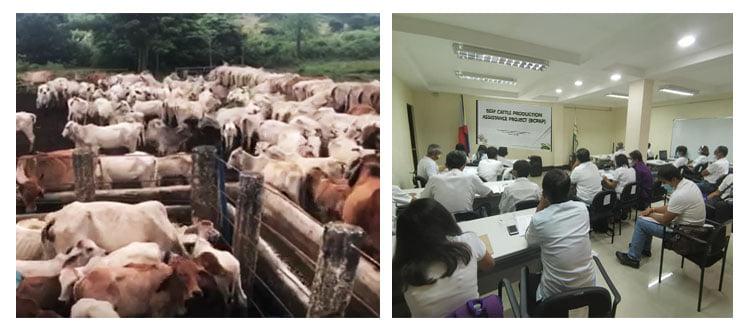The National Tobacco Administration is taking another step towards increasing income of farmers through its Beef Cattle Production Assistance Project (BCPAP). For the new initiative, the agency has allocated P10 million from the Tobacco Farmers Production Assistance or Investment Outlay for 2020, under its Integrated Farming and Other Income Generating Activities Project (IFOIGAP).
According to NTA Administrator Robert Victor G. Seares Jr., 250 ready-to-breed upgraded Brahman heifers will be distributed for the initial implementation to selected tobacco growers in Abra, Ilocos Norte, Ilocos Sur, La Union, Pangasinan, Isabela and Cagayan.
The distribution of the cattle to the qualified farmer-cooperators will be held this November.
Speaking online from the Central Office in Quezon City to the project implementers in the provincial branch offices, Administrator Seares said that BCPAP will help jumpstart the beef cattle industry in the tobacco growing provinces and will also forward the vision of the Department of Agriculture for advancing food sufficiency in the country.
The online training for the project held on October 26 was organized by the Office of the Deputy Administrator for Operations under the leadership of Dr. Roberto R. Bonoan.
According to Bonoan, beef cattle production is one of the livelihood components of the agency’s five-year industry development plan, or the Sustainable Tobacco Enhancement Program (STEP), to increase productivity and farmers’ income.
The new initiative took off during the term of the late Administrator Robert L. Seares as a production and marketing intervention for the tobacco farmers.
NTA already has an established production and marketing intervention for the tobacco farmers through the NTA Kadiwa ni Ani at Kita (formerly AgriPinoy Projects), with its value-adding component, the Tobacco Farmers Food Processing and Trading Center; and livelihood programs, such as Rice Production during tobacco offseason, the Gulayan at Manukan sa Barangay, Vegetable Seeds Distribution, and Kahuyang Pangkabuhayan at Pangkalikasan.
Mikael Benedict Carmelo G. Crisologo, veterinary doctor and consultant to the NTA Kadiwa, discussed during the online training the program guidelines and entertained suggestions from the participants.
Per project guidelines, prospective farmer-cooperators must be registered tobacco farmers with the NTA and under the Registry System for the Basic Sector in Agriculture and Fisheries (RSBSA). They must be willing to undergo cattle production training, and have the capability to provide cattle shed housing and equipment, labor, adequate grazing area, supplementary feed, and clean water source.
As an initial step, the project implementers will conduct training/seminar to the farmer cooperators on cattle production, including grazing land development and organic feed production.
Other essential project components include production technology package, artificial insemination services, and technical support services/animal health services.
Production assistance shall be repaid with two 12-month-old cows, the first and third offspring, within a maximum period of six years. The first offspring is the repayment which is to be loaned out immediately to next-in-line or downline farmer-cooperator, and the third offspring for the second repayment, to be sold out as income of the agency to recover investment.
[Melanie Rapiz-Parel]

